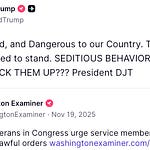We discuss the response of TikTok providers to the administration’s non-enforcement pledges—including the companies’ legal liability and whether their responsibility to comply with the law runs past potential liability.
Read Bob’s piece from yesterday about the providers’ conduct here.
And check out Jack’s assessments of the legal basis for the non-enforcement of the statute here and here.
This is an edited transcript of an episode of “Executive Functions Chat.” You can listen to the full conversation by following or subscribing to the show on Substack, Apple, Spotify, or wherever you get your podcasts.
Jack Goldsmith: Good morning, Bob.
Bob Bauer: Good morning, Jack.
Today we're going to talk about the TikTok ban, which is not really a ban on TikTok, but rather a ban on the internet service providers and related companies through which TikTok runs.
I and others have written a lot about the illegality of the Trump administration's blanket refusal to enforce the law. You wrote a piece earlier this week that expanded the lens to look at the companies who are violating the law. So why don't you tell us what you said, and we'll have a conversation about it.
Certainly. The attention has been largely paid to what Trump did in his executive order, and then the follow-up letters from Attorney General Bondi purporting to confer immunity on the companies for violating the act and absolving them of any liability for the period of time these executive orders have been in effect. They've been extended multiple times.
There's no indication that the administration does intend to enforce the statute. And there are no signals to the administration, say from the Congress and from allies of the President in the Congress, the majority in the Senate, that they're going to force his hand in any way, that they're going to insist on compliance.
I wanted to expand the lens to talk a little bit more about something that has received less attention—and that is the response of the companies. The companies have decided essentially to accept the devil's bargain. So they're also disregarding the statute. They're disregarding the statute purportedly in reliance on the executive order and, maybe even more to the point, on the Bondi letters that assure them that they will not be deemed to have violated the act, nor to be in the future violating the act for as long as these non-enforcement orders are in effect.
And I wanted in this piece to just explore what it means for some of these companies, all of these companies—some of whom are the most dominant companies or among the most dominant companies in the American economy, playing such an outsized role in our society—to, in effect, hand-in-hand with the President, completely disregard a law that they understand perfectly well is being illegally suspended in enforcement.
And I look a little bit at the statements they've made about their compliance policies and their business ethics codes. Their actions now are not consistent with the commitments they've made in those ethics codes. I take ethics seriously. It's a point I keep on coming back to, with varying degrees of success with different audiences, but they are not doing what they committed to do.
But in any event, one question we can discuss is, what were their lawyers thinking they needed to do in the way of maximally protecting the company? What inquiries about the administration's legal position did they ever make? The FOIA requests that yielded the Bondi letters were directed only to communications from the Department of Justice. They were not directed at communications that the Department of Justice may have received from the companies.
And the companies have just simply either declined to engage with any questions about this or have outright, in Google's case, refused to answer those questions. So that's the thrust of the post—that this is really a very deeply troubling situation and hopefully doesn't augur for corporate responsibility in this period of executive lawlessness in the future.
So you say the companies are not doing what they committed to do, and you mean comply with the law and comply with ordinary business ethics?
That's correct. Both: comply with the law, and in circumstances like this, provide the degree of transparency they owe the public at large. They're taking an action that is plainly in absolute defiance of the law, in reliance on representations made by the executive that themselves do not have a legal underpinning. And they are not transparent about the rationale they're relying on or the responsibility they're taking for this action.
So let's imagine that we're the general counsel of one of these companies. How does a general counsel think about that? Because my view is—and we can explore this a little later—there's no plausible private or public liability that the companies face here.
I don't think a private party with standing can sue. I don't believe there's a private cause of action to sue. The government has suggested it found the law illegal with regard to the president. That's why the president's not enforcing it. And the Justice Department has absolved the companies of any legal liability forever.
So are you suggesting that despite those representations, the general counsel of Google or Amazon or whatever should have advised the company that they needed to shut TikTok down?
The decision of whether to shut TikTok down is of course one that rests with the company board of directors.
I'm sorry, let me restate. Should counsel have advised the company that it would be illegal not to shut down TikTok?
That's correct. I think that's in fact what most likely happened. I can't imagine a general counsel, in written or oral communications to the officers and to the board, in any way suggesting that it is a lawful arrangement with this administration to disregard the statute, that they can rely on the legal position that the administration has taken, reflected primarily in the Bondi letters.
At a minimum, they owed candor to the board about what the law is and about the lawfulness of what the administration is doing here. The one question that I have then is: What is, if you will, due legal diligence in these circumstances?
So one question I raised in the article is, did the companies even bother, by some communication with the administration, to determine whether the question had been referred to the Office of Legal Counsel? Was there anything more behind the letters that Bondi issued in which she makes sweeping claims? And by the way, the letters don't even cohere as a legal defense. They don't really make a whole lot of sense.
But having said that, what more did they do in the way of a record of due diligence? Did any of these companies attempt to establish that? Or did they just enter into a bargain, a sort of realpolitik with the administration? They could do it without any concern that they would incur legal liability in this administration, and they are banking on not having to suffer at the hands of a different administration in the future.
I want to get to the different administration in the future in a second. But why do you think it's relevant whether they asked the Justice Department whether the Office of Legal Counsel opined on this? This is a conclusion by the attorney general. Whether OLC opined or not is irrelevant if this is the legal conclusion that the attorney general has made.
In a normal administration, you might think OLC has some quasi-independence and would offer a professional legal judgment. There's no reason to think that is true in this administration. So why would that set of queries matter?
Let me refer again to these business ethical obligations that they have. If caring about compliance means anything, it means establishing a full record that the company explored the legal position it is currently relying on. And the Bondi letters just don't cut it.
I mean, nobody could answer the question from a board member: do you find the Bondi letters persuasive? Do they represent a reasonable position on the legal issues in the case? And imagine the general counsel saying, “Yes, they're fine by me.”
And so then the question a board member might ask is: Well, what more can we learn about the legal basis for the administration, which ultimately relates to what risks of liability the companies may be running? And as you suggest, we'll get back to the question of whether they actually are running any risks. But that sort of taking the law seriously, it seems to me, is something that for these major companies—frankly, you’d hope for any private concerns—would be reflected in the activities of the counsel in advising the board. And on the part of the board in pressing the counsel to fully understand what is at stake legally for the companies.
There's no evidence of this now. It may be that it took place—we just don't know. And the companies are not speaking to the issue.
I can certainly understand strategically why not. Google, as you noted in a prior posting, and as I note in this one, has faced a shareholder suit seeking board minutes and materials that may have revealed how the company discussed the legal issues here and the liability it faced. The company, just to use the expression, told the shareholder to pound sand and declined to offer any answer unless compelled by court order.
One more quick question on this. Isn't there a danger in asking the attorney general who she consulted and whether there’s really a legal analysis here? There's zero chance an attorney general would answer. Maybe it would be good to ask, just in terms of due diligence, if you get an answer saying, “Sorry, I can't tell you.” But what if you get an answer saying, “There's no legal analysis. This is just my legal conclusion, I did it in my office one night.” That makes it harder for what you’re trying to do here.
I don’t know if it does, for two reasons. First, as you point out, you’ve asked the question. Second, all the attorney general has told you is that the source of law you're looking for is reflected in her letters, and that's what you should be looking to. There's nothing else there.
And when a board member says, “Are the Bondi letters satisfactory?” the answer is, “Of course not.” And when they ask, “Is there anything more?” the answer is, “No, and we've asked.” That, to me, is due diligence.
This is what we’re dealing with. We’re dealing with the Bondi letters and the legal position laid out in the Bondi letters, and there’s nothing else behind them.
So I imagine the general counsel writing a two-part memo. Part one: We have a clear legal duty to comply under this law. Part two: There's zero chance of enforcement against us by this administration, by a private party now, or by any future administration.
I think that maybe zero chance about a future administration prosecuting is a little aggressive, but not much. I think there's practically no chance that a future administration—assuming space in statute of limitations—would prosecute under this, in light of the Bondi representation. And I think this, because of the doctrine of entrapment by estoppel, which basically says it would be a due process violation to prosecute someone for something DOJ previously told them was lawful.
Now, the application of entrapment by estoppel to DOJ is very uncertain. I just want to read what Michael Dreeben, the person representing the special counsel in Trump v. United States, said about entrapment by estoppel. He said “it would be a due process problem to prosecute a president who received advice from the attorney general that his actions were lawful, absent the kind of collusion or conspiracy that itself represented a criminal violation.” Translated here, it would be a due process problem to prosecute a company that received similar advice. Basically, Dreeben is saying to be able to overcome entrapment by estoppel, there has to be a criminal conspiracy between the attorney general and the person that she is advising.
I don’t think that this rises to that level. So tell me why I'm wrong to think there's zero chance a future administration prosecutes here.
Let me say, first, about Dreeben's exchange in the immunity case: It’s really quite striking. It shows you how the world that we live in has changed so dramatically. He’s discussing the legal advisory structure in the administration as a critical safeguard against presidential misconduct and arguing against the blanket immunity for former presidential misconduct that was an issue in the case.
And he talks at length about how things normally work. The attorney general and the DOJ take the law seriously. They’re conscientious in examining the legal issues that the president puts before them. Even though Justice Alito, in particular, as I recall, expressed some skepticism about the entire independence and conscientiousness of attorneys general over time, that is the background assumption in Dreeben’s case.
It simply doesn’t apply at the time in this case.
It doesn't apply. I will accept that for purposes of this argument, but is that going to be legally relevant?
Well, this is what I'm driving at. What would it mean to say that there is a due process defense—a legal defense, not a practical defense? Let's go on and talk in a moment about the practical defense, but let's start with a legal defense against another administration proceeding in the face of Bondi's letters to prosecute.
What is the legal limiting principle there? If the position that an administration takes is so outrageous, it is so clearly illegal, and the companies know it—and, let's put it this way, dispassionate observers across the entire legal spectrum know it—that’s really going to be a defense? When the company knows perfectly well, whether it's an actual or affirmative conspiracy or collusion with the administration or not, it knows perfectly well that what it's doing is illegal.
That means that nonetheless, they're immunized from future prosecution by another administration? I find that really astonishing, actually. So imagine, for example—and now I'm going to take this a little bit into sci-fi world, so bear with me. I'm not going to defend the realism. (I hope I'm not going to have to defend the realism of this hypothetical.)
Let's assume that a company engages in basically completely illegal conduct to destroy a competitor—hacking, breaking and entering, violation of non-compete clauses, whatever it is. Somehow, with respect to any federal issues that are implicated, it seeks from the Attorney General of the United States an opinion that in fact there are no legal consequences to these behaviors. It then proudly presents this record to the next administration and announces that it has a complete legal defense, a due process defense. How can that be? How can that possibly be?
Yeah, fair. And again, we don't know the contours of entrapment by estoppel. And the Dreeben statement was maybe a little bit aggressive in describing entrapment by estoppel.
But for me, it's not the legal defense to a prosecution that would preclude a later DOJ successfully prosecuting Google. I think there is practically zero chance that a subsequent Justice Department—let's say of an AOC administration or some future Democratic administration—I think there's zero chance that they prosecute here, because that would be breaching a hugely important norm (and I'm using that word advisedly) that administrations, Justice Departments across administrations, rely on. Namely, that their own legal opinions can be relied upon when they say, “We're not going to prosecute here for various things.”
They want those representations to be relied on. And if it would be as much of a norm breach as this is—and it really is—it would be a massive norm breach to prosecute someone that relied on a clear Justice Department representation.
And I don't think it's the law that would prevent it from happening, but the institutional self-interest of the future Justice Department.
Maybe, although we've seen that the norms that have typically governed the relationship with the president, the attorney general, or the Department of Justice—those norms have really frayed, if they're intact at all. So what to say about how somebody views those norms in the future, and the extent to which they view them to be binding, to me, is kind of uncertain.
I will say that—and this is the background of all of this—the largest reason that a future administration won't do it is that, in simple terms, people like TikTok. I mean, one of the guarantees that this particular legal scam will succeed is that this is a massively popular social media platform. And a future administration will probably be more swayed by that than by any frustration over the lawlessness of the administration.
But let me just take the question of legal liability into some other directions. Could an administration decline to prosecute, but—particularly if it had at least one House of Congress in its camp—hold the companies to uncomfortable account for what they've done, conduct a hearing, write letters? They could.
Yeah. So I agree with everything you just said. First thing, I completely agree that the popularity is a hugely important factor here. My son asked me last night whether I thought TikTok was going to continue for a while, and I said, I think so, for a long time.
But if the combination of the massive popularity of TikTok—at least for now, I mean, it used to be very, very unpopular on Capitol Hill, recently—plus what I do think is legal uncertainty about entrapment by estoppel, about the contours of that, plus the institutional self-interest point I made, which has some bite... I think those three factors make it practically very unlikely. That's just where I land.
I just wonder, though, if you're the general, do you actually write—this is my last question—do you actually write a memo like that? And does a CEO actually say, okay? I.e., a memo that says, what we're doing is clearly unlawful, but there is zero chance that we're ever going to face legal liability for it. And on that basis, what is a CEO supposed to do?
And let me just say, you just said that TikTok was very popular. So is Apple supposed to take it off of its app page because it's clearly illegal, even though it faces no liability? Is that what you think should happen here?
What I think should happen is the companies should be accountable, accepting that businesses are businesses. And there's something more than even the popularity, although it's related to the popularity of TikTok. And that is the huge competitive disadvantage that companies will experience if they comply with the law high-mindedly, and their competitors happily steal off into the night and do exactly the opposite.
And that's going to be, of course, a decision that a business is going to be extremely reluctant to make when the revenues involved here are so substantial and the popularity of the product is what it is.
As to the writing question, I think more likely—and again, I can't speak to the practices in every company—but more likely, this is a conversation, as I think the shareholder who filed that lawsuit seeking board minutes and materials understood, is going to be reflected in oral exchanges between the counsel and the company, between the counsel, the board, and the officers.
So I don't know that there’ll be a 50-page memo saying, “Yes, we're violating the law.” In fact, there may even be some direction by the general counsel to their own lawyers to put the best possible face on it and try to shore up the very poor argument that Bondi made.
So I think that's most likely and more prudently what would happen here. But let me just stress, I totally agree that we shouldn't be naïve about this. We understand why the companies are doing this. I don't want to pretend otherwise.
But there's a distance between the way they're handling this—which is to just go ahead and agree to participate in this lawless scheme—and their utter and total lack of accountability for it, including their refusal, for example, in the Google case to even provide responsive materials, in response to what I think is a completely legitimate shareholder inquiry.
That's a great place to stop. Thanks so much.
Thank you very much.













